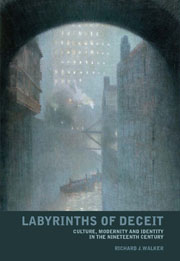Book contents
- Frontmatter
- Contents
- Acknowledgements
- Introduction: Tracing the fragments of modernity
- Part I (De)Generating doubles: duality and the split personality in the prose writing of James Hogg, Robert Louis Stevenson and Oscar Wilde
- Introduction
- 1 Speaking and answering in the character of another: James Hogg's private memoirs
- 2 He, I say – I cannot say, I: Robert Louis Stevenson's strange case
- 3 The psychopathology of everyday narcissism: Oscar Wilde's picture
- Part II The stripping of the halo: religion and identity in the poetry of Alfred Tennyson, James ‘B. V.’ Thomson and Gerard Manley Hopkins
- Part III Infected ecstasy: addiction and modernity in the work of Thomas De Quincey, Alfred Tennyson, Christina Rossetti and Bram Stoker
- Conclusion: Ghost-script
- Notes
- Bibliography
- Index
1 - Speaking and answering in the character of another: James Hogg's private memoirs
from Part I - (De)Generating doubles: duality and the split personality in the prose writing of James Hogg, Robert Louis Stevenson and Oscar Wilde
- Frontmatter
- Contents
- Acknowledgements
- Introduction: Tracing the fragments of modernity
- Part I (De)Generating doubles: duality and the split personality in the prose writing of James Hogg, Robert Louis Stevenson and Oscar Wilde
- Introduction
- 1 Speaking and answering in the character of another: James Hogg's private memoirs
- 2 He, I say – I cannot say, I: Robert Louis Stevenson's strange case
- 3 The psychopathology of everyday narcissism: Oscar Wilde's picture
- Part II The stripping of the halo: religion and identity in the poetry of Alfred Tennyson, James ‘B. V.’ Thomson and Gerard Manley Hopkins
- Part III Infected ecstasy: addiction and modernity in the work of Thomas De Quincey, Alfred Tennyson, Christina Rossetti and Bram Stoker
- Conclusion: Ghost-script
- Notes
- Bibliography
- Index
Summary
It is impossible that I can have been doing a thing, and not doing it at the same time. But indeed, honest woman, there have several incidents occurred to me in the course of my life which persuade me I have a second self; or that there is some other being who appears in my likeness.
I knew a very intelligent and amiable man, who had the power of thus placing before his eyes himself, and often laughed heartily at his double, who always seemed to laugh in turn.
In the context of the issues that have been discussed so far James Hogg's The Private Memoirs and Confessions of a Justified Sinner may seem an unusual text to choose when the themes and ideas at stake in this project are considered. Neither the first nor the most famous representation of duality in fiction – the latter accolade must surely go to Stevenson's Jekyll and Hyde, a text which in its title alone has become virtually synonymous with populist accounts of schizophrenia – Hogg's strange and idiosyncratic novel initially seems very removed from the debates regarding modernity and identity alluded to earlier in this discussion. Indeed Private Memoirs seems to inhabit a historical and geographical territory that has little to do with the urban metropolis of the nineteenth century and the crises that it engenders.
- Type
- Chapter
- Information
- Labyrinths of DeceitCulture, Modernity and Identity in the Nineteenth Century, pp. 49 - 67Publisher: Liverpool University PressPrint publication year: 2008

